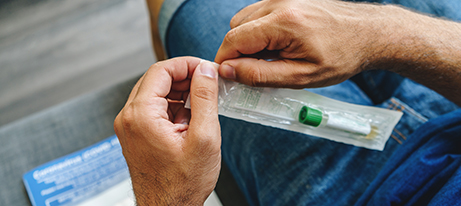
Getty Images/Circle Creative Studio
A spate of Food and Drug Administration (FDA) emergency use authorizations (EUAs) for SARS-CoV-2 diagnostics reflects a diversity in testing methods and sample types as developers have advanced their innovations during the ongoing COVID-19 pandemic. As of late October, FDA had issued EUAs for 284 tests: 221 molecular tests, 56 antibody tests, and seven antigen tests. Some provide innovative sample collection technologies while others have received updates to allow for screening or home collection.
“We prioritize review of EUA requests for tests taking into account a variety of factors . . . such as the public health need for the product and the availability of the product,” FDA recently stated in its Q&A on testing for SARS-CoV-2. Right now, the agency is prioritizing tests that increase accessibility, such as point-of-care and home collection, or those that increase testing capacity. For this reason and others, FDA said it would not be issuing any EUAs for laboratory-developed tests (LDTs). An AACC panel of laboratory medicine experts recently expounded on the importance of LDTs in diagnosing and managing SARS-CoV-2 and why these tests should not be regulated further by FDA.
Since September 1, FDA has issued 18 new or updated existing EUAs for home collection molecular-based tests/kits. These are:
Interest in pooling samples has grown as labs continue to face challenges accessing testing supplies. Since September 1, FDA has issued 10 new or updated existing EUAs to permit pooled samples. These are:
Providers this fall and winter are facing the daunting task of distinguishing flu from COVID-19. FDA has authorized six multianalyte tests to support those efforts. These are:
FDA has also issued updates and new issuances for reverse transcription polymerase chain reaction (RT-PCR) technologies. These include:
While most SARS-CoV-2 tests rely on RT-PCR, FDA since September 1 has granted EUAs to 12 tests that use other methods.
- These include four assays based on RT-LAMP:
- Two use RT-PCR and MALDI-TOF mass spectrometry:
- Two others use RT-PCR and sequencing:
- The BillionToOne qSanger-COVID-19 Assay uses sequencing alone.
Abbott Diagnostics Scarborough’s ID NOW COVID-19 test uses RT and isothermal amplification. Alimetrix’s Alimetrix SARS-CoV-2 RT-PCR Assay combines RT-PCR with microarray hybridization. And, Hologic’s Aptima SARS-CoV-2 assay uses transcription-mediated amplification and Dual Kinetic Assay.
FDA to date has approved seven antigen tests. Three new antigen tests joined the list in October:
Among 15 serology tests approved since September 1, four detect total antibodies and four detect IgG and IgM. They use technologies including ELISA, indirect chemiluminescence, fluorescence immunoassay, lateral flow, and photometric immunoassay.
The agency has also approved a number of saliva-based tests since September 1. However Spectrum Solutions’ SDNA-1000 Saliva Collection Device is the first EUA granted specifically for use as a saliva collection device. OraSure Technologies’ DNA Genotek subsidiary on October 19 received an EUA for its saliva collection and stabilization device, enabling unsupervised use of the device at home or in a healthcare setting when used as part of an approved or validated at-home test kit.